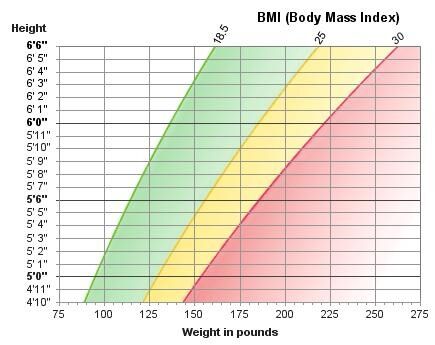
Weight Management
In this article we’ll look at how to tell if you're overweight, as well as some of the reasons why people can become overweight.
Are you overweight?
This article has been medically approved by Pharmacist Sumaiya Patel - GPhC Reg No: 2215078
Being overweight, in particular being obese, is a major health problem. It carries an increased risk of heart attacks, stroke, blood clots, high blood pressure, diabetes, liver disease, lung disease, cancer, arthritis, infertility and premature death.
Weight gain and obesity is a major problem in the UK. The latest NHS figures* from 2018 show that the majority of adults were overweight or obese; 67% of men and 60% of women, including 26% of men and 29% of women who were obese. And the problem starts young. The latest figures from 2019 show that 20% of year 6 children were classified as obese. [1]
Are you overweight?
Weight is assessed by taking a person’s body mass index (BMI) - this is your weight in kilograms divided by your height in metres squared.
In other words, you can determine your BMI by dividing your weight in kilograms by your height in metres and then dividing the answer by your height again. Ideal BMI is 18.5-25. If your BMI is between 25-29 you are ‘overweight’. If your BMI is between 30-40 you are ‘obese’. If your BMI is between 30-40 you are ‘obese’. A person with a BMI over 40 is termed ‘morbidly obese’. BMI over 50 is malignantly obese.

Previously, most obesity experts considered that total body fat was the main predictor of weight-related disease. Now, it is thought that the location of fat is equally if not more important than total body fat.
If you have more weight in the waist area (apple-shaped) you are at greater risk of health problems than if your extra weight lies on your hips and thighs (pear-shaped). For example:
- If you are a man with a waist measurement greater than 94cm you are at risk of developing weight-related health problems, and the risk is even higher if your waist measurement exceeds 102cm.
- If you are a woman with a waist measurement greater than 80cm you are at risk of developing weight-related health problems, and the risk is even higher if your waist measurement exceeds 88cm.
Although BMI is widely used for weight assessment, it is not appropriate for everybody. Athletes with a high proportion of muscle mass will have a high BMI but will have very little excess fat.
Also, BMI is most applicable to the physique of people of Western origin, and may, therefore, understate the health risks of people of Far Eastern origin who tend to weigh less and have a lighter body frame. Special charts are used to assess weight in children.
What causes people to become overweight?
The main cause is eating more calories than you burn off. If you consume calories (units of energy in food) but fail to burn it off through physical and metabolic activity, the calories get converted into fat cells.
Fast foods with high saturated fat content and high-calorie snacks are perhaps the greatest cause of obesity, particularly among children. These foods tend to give a short-lived energy boost but have a very low nutritional value. Once the energy boost has gone the body craves another energy boost and, because the body still lacks the essential vitamins and minerals it was seeking in the first place, you feel that you want to eat again. This establishes a cycle of eating and craving that leads to weight gain. A balanced diet rich in fruit and vegetables, eaten at proper meal times, helps to break this cycle.
Over-eating is another cause of obesity. The part of your brain that controls appetite soon adapts to these large portions and does not send the message to tell you to stop eating. Meal sizes get bigger and bigger, and the weight piles on.
Meal-skipping is also likely to result in weight gain. US researchers recently used brain imaging to demonstrate that people who skip meals make bad food choices. After hours of deprivation, the brain's reward centre goes into overdrive when it finally encounters the opportunity to eat causing us to opt for sweet and fatty foods.
Far from skipping meals, it makes sense to do the opposite - opting for many small meals throughout the day rather than one or two big binges.
Grazing rather than gorging boosts your metabolic rate, reduces hunger by stabilising blood sugar levels, and keeps your energy levels high.
Genetics may predispose a person to a slow metabolism (which means it takes longer to burn up calories) making it harder to lose weight but even in these circumstances, weight loss is still possible.
Some medical conditions (such as problems with your thyroid gland) may make weight gain more likely and certain medicines can cause weight gain as a side-effect. Common ones that do this include corticosteroids (steroids), antidepressants and some oral contraceptives.
Being overweight can affect the way you feel on a daily basis and can put your long-term health in jeopardy. In the short-term being overweight may make you feel tired and affect your ability to sleep (often causing you to snore). It can also affect self-confidence.
In the long-term, it increases your likelihood of problems such as heart disease, diabetes, back pain and arthritis.
If you need support with your weight loss goals, try Pharmacy2U's Online Doctor service. With the leading online Pharmacy, you can speak with an experienced, registered doctor who can advise you on the different weight loss treatments available to you.
[1] https://digital.nhs.uk/data-and-information/publications/statistical/statistics-on-obesity-physical-activity-and-diet/england-2020

